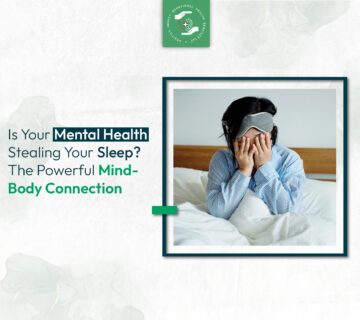Mood stabilization can sometimes feel like an elusive goal, especially when you’re dealing with anxiety, depression, or other mood disorders. While medication and therapy are essential components of managing your mood, lifestyle changes can also play a significant role. This blog will explore how certain lifestyle adjustments can contribute to mood stabilization and help you lead a more balanced life.
The Role of Healthy Eating
A balanced diet is more than just fuel for your body; it’s also essential for your mental health. Nutrients such as omega-3 fatty acids, B vitamins, and probiotics, found in foods like fish, leafy greens, and yogurt, can support brain function and stabilize mood.
Interestingly, what you eat can have a direct impact on your mood. Studies have shown that diets high in refined sugars and processed foods can contribute to increased anxiety and depression. On the flip side, diets rich in whole foods such as fruits, vegetables, lean proteins, and whole grains are linked to better mood and overall mental well-being.
One key player in the food-mood connection is tryptophan, an amino acid found in foods like turkey, eggs, and bananas. Tryptophan is a precursor to serotonin, a neurotransmitter that helps regulate mood. Increasing your intake of tryptophan-rich foods can promote a better mood and even help reduce symptoms of depression.
Hydration is another essential aspect of mood stabilization. Dehydration can lead to mood swings, irritability, and difficulty concentrating. Aim to drink at least eight glasses of water a day, and be mindful of your body’s signals of thirst, which can often be mistaken for hunger.
Adopting a mindful eating practice can also contribute to mood stabilization. By paying attention to your hunger and fullness cues and savoring each bite, you can create a more positive relationship with food, thereby enhancing your emotional well-being.
Exercise and Physical Activity
Physical activity releases endorphins, which are natural mood lifters. Regular exercise can help reduce symptoms of anxiety and depression, offering an effective supplement to other treatments.
You don’t need to become a gym enthusiast to reap the mental benefits of physical activity. Simple activities like walking, gardening, or even dancing in your living room can significantly boost your mood. The key is to find an activity you enjoy, making it easier to stick to a regular routine.
Consistency is crucial when it comes to exercise. Aim for at least 30 minutes of moderate activity most days of the week. This regularity can create a cumulative effect, significantly improving your mood over time.
Don’t underestimate the power of nature. Exercising outdoors, such as a hike in the woods or a walk in the park, can provide additional mental health benefits. The combination of physical activity and exposure to natural light and scenery can be incredibly refreshing and uplifting.
Group activities can also amplify the mood-stabilizing benefits of exercise. Whether it’s joining a local sports team, a dance class, or a running club, the social interaction paired with physical activity can provide a double dose of mental health benefits.
The Importance of Sleep
Quality sleep is crucial for mental health. Irregular sleep patterns or lack of sleep can exacerbate mood disorders. Establishing a regular sleep routine can significantly improve mood stability.
Sleep impacts nearly every aspect of mental and physical well-being. Poor sleep can lead to irritability, difficulty concentrating, and increased stress levels. Over time, chronic sleep issues can contribute to the development or worsening of mood disorders.
To promote better sleep, create a bedtime routine that includes winding down activities like reading a book, taking a warm bath, or practicing relaxation exercises. Consistency is key, so try to go to bed and wake up at the same time every day, even on weekends.
The sleep environment also plays a significant role in the quality of your rest. Ensure your bedroom is cool, dark, and quiet. Investing in a comfortable mattress and pillows can make a significant difference in how well you sleep.
Avoiding stimulants like caffeine and electronic devices before bedtime can help you fall asleep more easily. The blue light emitted by screens can interfere with the production of melatonin, the hormone that regulates sleep.
Mindfulness and Stress Reduction
Practices like mindfulness, meditation, and yoga can offer substantial benefits for mood stabilization. These activities help reduce stress hormones and create a sense of calm and balance.
Mindfulness involves paying full attention to the present moment without judgment. This simple yet powerful practice can help you become more aware of your thoughts and feelings, making it easier to manage stress and maintain emotional balance.
Meditation is another effective tool for mood stabilization. Even just a few minutes a day can help calm the mind, reduce anxiety, and improve overall emotional well-being. There are many types of meditation, so find one that resonates with you.
Yoga combines physical movement with mindfulness, offering a double benefit for mood stabilization. The physical postures, along with controlled breathing and meditation practices, can help reduce stress and enhance emotional balance.
Incorporating mindfulness into your daily activities can also be beneficial. Whether it’s mindful eating, walking, or even cleaning, bringing a sense of awareness and presence to these tasks can help reduce stress and improve your overall mood.
Building Social Connections
Human connections are fundamental to our emotional health. Engaging in social activities and building strong relationships can provide emotional support and help stabilize mood.
Loneliness and social isolation can significantly impact mental health, leading to increased feelings of depression and anxiety. Making an effort to connect with others, whether in person or virtually, can help mitigate these effects.
Quality over quantity is essential when it comes to social connections. Building a few strong, meaningful relationships can be more beneficial than having a large number of superficial connections. These close relationships provide a support network that you can rely on during challenging times.
Volunteering is an excellent way to build social connections while also giving back to the community. The sense of purpose and fulfillment derived from helping others can significantly boost your mood and overall mental well-being.
Don’t forget about online communities. Given the digital age we live in, building and maintaining relationships through social media or online forums can also provide valuable emotional support and a sense of belonging.
Final Thoughts
Incorporating strategic lifestyle changes can significantly enhance mood stabilization, complementing traditional treatments like medication and therapy. Small steps like adopting a balanced diet, regular physical activity, mindful practices, a robust sleep routine, and nurturing social connections can build a solid foundation for emotional stability. Remember, every change, no matter how small, leads you a step closer to a more balanced and fulfilling life.






No comment